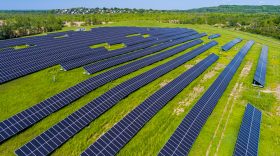Last week, concentrating photovoltaic (CPV) firm Amonix closed its Las Vegas factory.
The company began selling equipment online on July 18, according to the Las Vegas Review-Journal, but the 214,000-square-foot manufacturing plant has reportedly been idle since May.
The California-based company received a $15.6 million grant from the Department of Energy, which was approved under the Bush administration as part of a program called the Solar America Initiative. This was not the same program that had supported Solyndra and Abound Solar.
Amonix also qualified for $5.9 million in federal tax credits but the tax credit went unclaimed because the company didn’t generate any taxable income.
Amonix spokeswoman Kelly Rice said the plant shutdown is part of an adjustment to changing market conditions – that’s despite the fact that back in January, the company announced 200 layoffs and plans to restructure.
The plant in Las Vegas had only been open for just over a year and Rice said the company will vacate the factory in the coming month.
CPV technology uses lenses to focus sunlight onto a small area of high efficiency solar cells. While the technology is more efficient than conventional photovoltaics, the declining price of conventional PV panels has made CPV less competitive than had been predicted just years ago.

An Amonix installation at the River Mountains Water Treatment Facility in Henderson, Nevada. Credit: Amonix
“The global solar industry is facing significant challenges that are impacting solar manufacturers worldwide,” said Department of Energy spokeswoman Jen Stutsman.
“While today’s news is disappointing, the United States simply can’t afford to cede America’s role in the growing, highly-competitive solar energy industry,” Stutsman said.
Rhone Resch, CEO of the Solar Energy Industries Association, echoed Stutsman’s view, urging that this latest solar plant closure not become a political football.
“The closure of any plant and loss of jobs is always unfortunate. Amonix plans to restructure its operations to build a successful long-term future. Amonix has been supported with great hope by an array of private investors as well as Republican and Democratic policymakers, who all understand our need to invest in this growing industry,” said Resch.
“None of them expected this innovative company led by a true American entrepreneur to face such tough challenges; but that’s the reality of today’s intensely competitive solar industry.”
“This should not be a political story, but rather a story of an evolving and competitive industry that is benefitting all of us, across the country,” he said. “America needs everyone working to help the industry continue to thrive, rather than working to make solar nothing more than a political football.”




